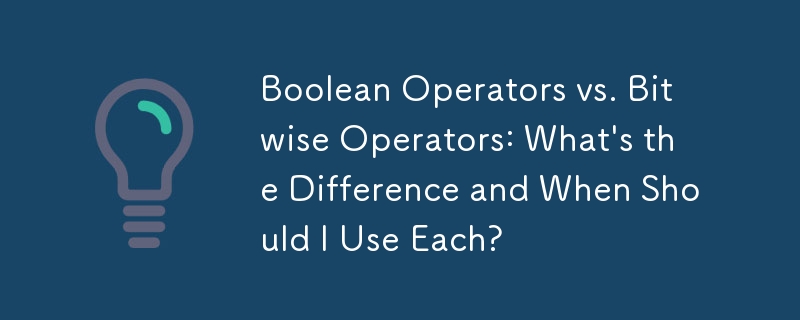Home >Backend Development >Python Tutorial >Boolean Operators vs. Bitwise Operators: What's the Difference and When Should I Use Each?
Boolean Operators vs. Bitwise Operators: What's the Difference and When Should I Use Each?
- Mary-Kate OlsenOriginal
- 2024-12-05 06:53:10967browse

Boolean Operators vs Bitwise Operators
When embarking on programming endeavors, understanding the distinction between Boolean and bitwise operators is crucial. These operators, denoted by "and" vs "&", "or" vs "|", fulfill distinct roles depending on the data types and desired outcomes.
Boolean Operators
Boolean operators are primarily utilized with boolean values, which represent truth values of either True or False. These operators carry out logical operations:
- and (&&): Returns True only if both operands are True.
- or (||): Returns True if either or both operands are True.
Bitwise Operators
In contrast, bitwise operators are often used on integer values. They operate on the binary representation of integers, manipulating bits at the individual level:
- &: Performs a bitwise AND operation, setting the resulting bit to 1 only if both corresponding bits in the operands are 1.
- |: Performs a bitwise OR operation, setting the resulting bit to 1 if either or both corresponding bits in the operands are 1.
Key Differences
The primary distinction between Boolean and bitwise operators lies in their behavior with respect to data types and short-circuiting:
- Boolean operators operate on boolean values, while bitwise operators operate on integer values.
- Boolean operators exhibit short-circuiting behavior, meaning evaluation stops when a definitive result is determined. Bitwise operators, on the other hand, always fully evaluate both operands.
Example:
Consider the expression:
if x is not None and x.foo == 42:
# ...
Using the bitwise "&" operator instead of the Boolean "and" would yield an AttributeError because the second operand is always evaluated, regardless of the value of x. With the Boolean operator, if x is None, the second operand is not evaluated, preventing the attribute error.
The above is the detailed content of Boolean Operators vs. Bitwise Operators: What's the Difference and When Should I Use Each?. For more information, please follow other related articles on the PHP Chinese website!

